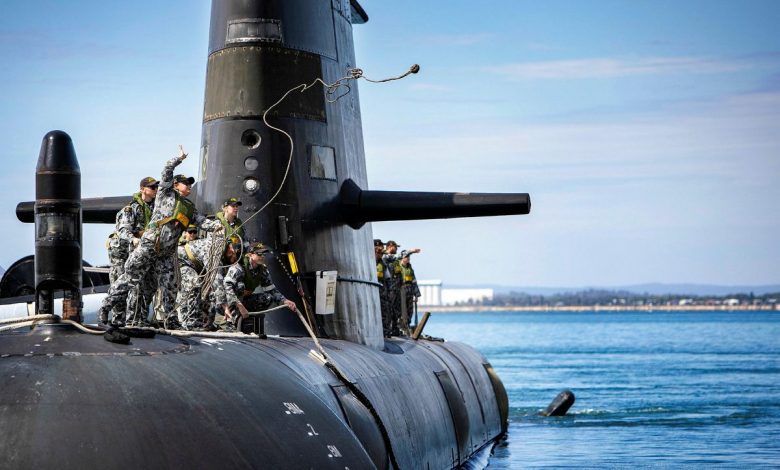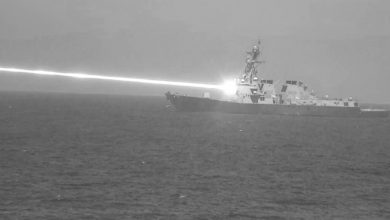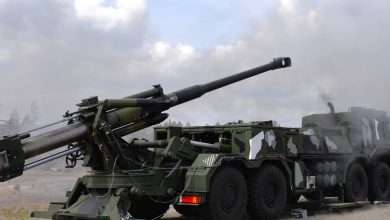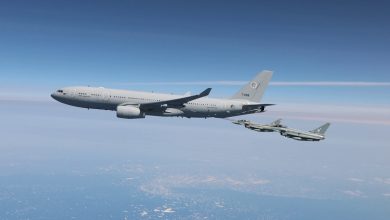U.S., Britain, Australia to move ahead on defence pact with nuclear submarine announcement

Canada’s exclusion from the pact is a sign Canada’s allies are growing tired of its refusal to take national defence seriously, a defence analyst says
Canada’s omission from a military pact involving three of its closest allies is symptomatic of a larger problem in how this country is perceived by its friends, experts are warning, as the U.S., Britain and Australia move ahead on their deal.
U.S. President Joe Biden, British Prime Minister Rishi Sunak and Australian leader Anthony Albanese were at a naval base in San Diego on Monday to confirm the next steps of the trilateral agreement, known as “AUKUS” after the three countries involved.
That includes formalizing American and British plans to help Australia develop a fleet of nuclear-powered submarines in response to growing concerns about China’s actions in the Indo-Pacific region.
The Trudeau government has downplayed the importance of AUKUS to Canada, saying Ottawa is not in the market for nuclear-powered submarines, even as others have lamented its absence.
Those include a senior Canadian Armed Forces commander, Vice-Admiral Bob Auchterlonie, who worried in a recent interview with The Canadian Press about Canada not having to the same cutting-edge technology as three of its closest allies.
The head of the association representing Canada’s defence industry, who criticized Prime Minister Justin Trudeau for dismissing AUKUS as simply a “nuclear-submarine deal,” has also warned about the potential impact on Canadian military exports.
“Because of the pace of events that are unfolding in the Indo-Pacific area, our partners are moving on with essentially a clear direction in mind,” said Canadian Forces College professor Paul Mitchell, an expert on naval strategy and U.S. defence policy.
The strategy seeks to find a balance between confronting and co-operating with China, saying Canada will challenge it “in areas of profound disagreement” while working on together on areas of shared interest such as climate change.
That compares to the U.S., where Defense Secretary Lloyd Austin in a defence strategy released earlier this month described “an increasingly aggressive China” as a “generational challenge” and the American military’s top priority.
“What are we trying to accomplish here?” Mitchell said. “That’s the thing that really mystifies a lot of people. With the United States, there’s clearly an end there in terms of backing up its regional hegemony in the area and support to rules-based order.”
This reflects not only Australia’s more realistic and innovative approach to diplomacy, Mulroney said, it is also the product of Canberra’s willingness to invest the necessary resources in making such a partnership become reality.
Numbers remain uncertain, but Australia is reportedly poised to spend billions as part of the deal to purchase new submarines. Britain and the U.S. are also expected to put money into the agreement for technology development, training and other areas.
“Canada was once a font of similarly bright and ambitious ideas and was consistently willing to contribute to their realization,” he said. “Sadly, we’re now no longer even part of the conversation.”
They also have solid plans to build new submarines, while Ottawa has yet to even commit to replacing the Royal Canadian Navy’s four trouble-plagued Victoria-class vessels, let alone start work on plans to build or buy a new fleet.
That is despite military commanders having repeatedly underscored the need for submarines, including chief of the defence staff Gen. Wayne Eyre last week.
“It’s an indicator that even among some of our closest allies, shared past experience and common history is not going to continue to get us invited to meetings as it may have in the past,” Perry said.
“It’s not a talk shop or a forum for getting together and having meetings. It’s a venue through which countries that are looking to make serious investments to deal with serious problems in their security relations are going to do so.”





